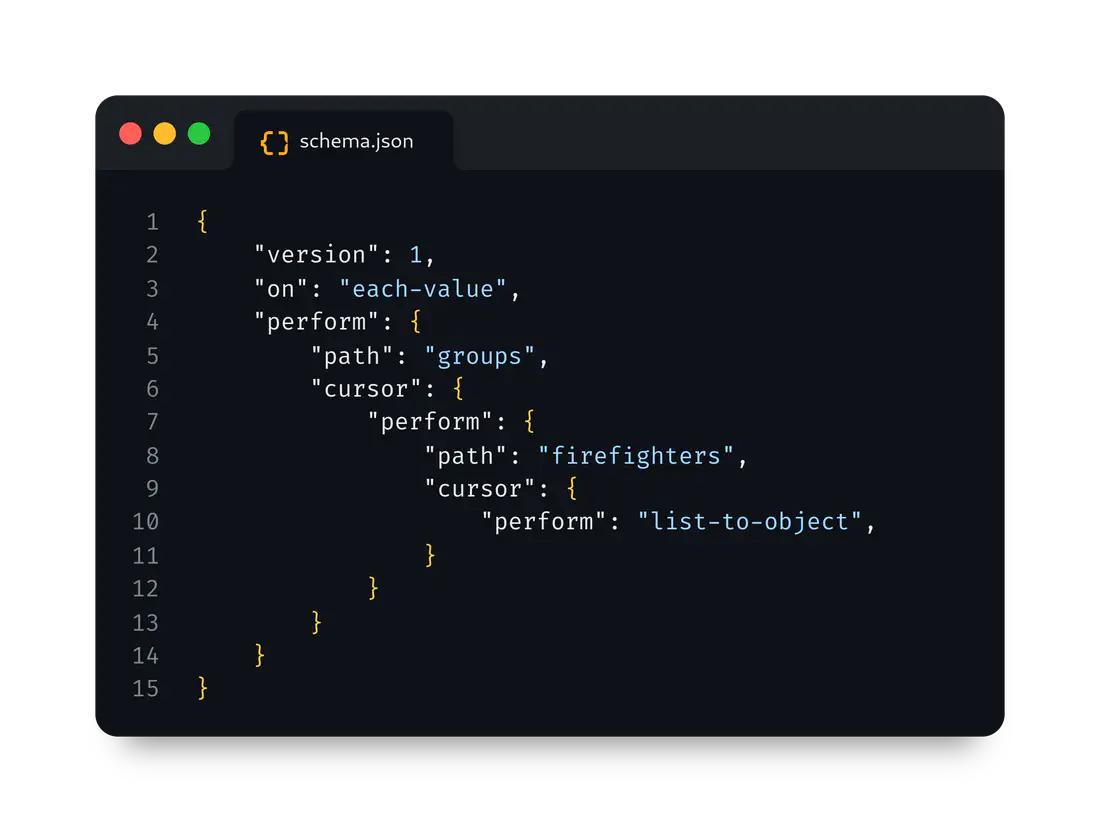Recompose v1.1; now with missing data handling!
By Cariad Eccleston • 👋 @cariad@indiepocalypse.social • ✉️ cariad@cariad.earth
I got ninety-nine problems, but a broken path ain’t one.

Last July, I released Recompose: a Python package for recomposing data by following instructional schemas.
Eh?
Let me explain
Let’s say, for example, you’ve got this data set:
{
"2023-06-04": {
"groups": {
"chefs": [
{
"name": "Alice"
},
{
"name": "Bob"
}
],
"firefighters": [
{
"name": "Daniel"
},
{
"name": "Esther"
}
],
"zookeepers": [
{
"name": "Gregory"
},
{
"name": "Harold"
}
]
}
},
"2023-06-05": {
"groups": {
"chefs": [
{
"namQe": "Jet"
},
{
"name": "Karen"
}
],
"firefighters": [
{
"name": "Mater"
},
{
"name": "Nigel"
}
],
"zookeepers": [
{
"name": "Peter"
},
{
"name": "Quentin"
}
]
}
}
}
…and let’s say you want to reduce those two “firefighters” arrays down to just their first values.
(It’s a niche problem, I grant you–but it’s one that trips me up on the regular.)
With Recompose, you can apply that transformation via this schema:
{
"version": 1,
"on": "each-value",
"perform": {
"path": "groups",
"cursor": {
"perform": {
"path": "firefighters",
"cursor": {
"perform": "list-to-object"
}
}
}
}
}
In a nutshell, this directs Recompose to:
- Run a cursor over every root value (
"on": "each-value"), and within that: - Run a cursor over each child record’s “groups” key (
"path": "groups"), and within that: - Perform the “list-to-object” transformation (
"perform": "list-to-object") on each child record’s “firefighters” key ("path": "firefighters").
The schema is applied and data recomposed with this code:
from recompose import transform
transformed = transform(
schema,
data,
)
…and the result is this data set:
{
"2023-06-04": {
"groups": {
"chefs": [
{
"name": "Alice"
},
{
"name": "Bob"
}
],
"firefighters": {
"name": "Daniel"
},
"zookeepers": [
{
"name": "Gregory"
},
{
"name": "Harold"
}
]
}
},
"2023-06-05": {
"groups": {
"chefs": [
{
"name": "Jet"
},
{
"name": "Karen"
}
],
"firefighters": {
"name": "Mater"
},
"zookeepers": [
{
"name": "Peter"
},
{
"name": "Quentin"
}
]
}
}
}
But…
But what happens if the schema describes a path that doesn’t exist?
Recompose v1.0 requires paths to exist, and bones out with a KeyError if
they don’t.
Recompose v1.1, though–which I just released–has a new Options class so you
can decide for yourself whether Recompose skips that transformation or fails:
from recompose import Allow, Options, transform
options = Options(
missing_data=Allow.ALLOW,
)
transformed = transform(
schema,
data,
options=options,
)
And that’s the lot!
Recompose v1.1
Recompose v1.1 requires Python 3.9 or later and can be installed from PyPI at your leisure:
pip install recompose
The code is released under the MIT licence at github.com/cariad/recompose, too, and documented at cariad.github.io/recompose.
Have fun!